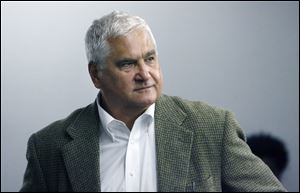
Restaurant owner accepted into diversion program to avoid prosecution
9/29/2010
Cousino
Restaurateur Tom Cousino said Tuesday he believes he won't have a problem living up to the expectations of the Lucas County pretrial diversion program, saying he'll "continue to live how I've been living."
Mr. Cousino, 64, who faced criminal charges of failing to pay sales tax on one of his restaurants, was accepted formally into the diversion program Tuesday. The program allows him time to pay the taxes he owes in exchange for avoiding any further criminal prosecution.
Mr. Cousino - whose family has maintained restaurants in East Toledo since 1946 - was charged in April with one count each of grand theft and failure to remit Ohio sales taxes, both fourth-degree felonies. He was accused of failing to pay thousands of dollars in sales taxes to the state of Ohio.
As of his court appearance Tuesday, authorities said he owed $67,819.21 in sales taxes from missed payments in 2008.
The longtime restaurateur said he intends to pay the money owed in the allotted time and put the incident behind him. He added that he remains surprised that what he believed was being worked out in a payment program had ended up in court.
"I'm so disappointed. It's beyond words," he said of the criminal charges filed against him. "I'm saddened by all the years of doing things the right way only to have a blemish on my name like this."
As a participant in the three-year diversion program, Mr. Cousino must make monthly restitution payments to the county clerk of courts office.
If he completes the program successfully - pays the full restitution, keeps his current sales tax up to date, and remains law-abiding - the felony charges will be dismissed. If he fails to complete the program, he will face the criminal charges.
The two charges carry a total of up to three years in prison.
According to Department of Taxation records, the criminal charges relate to his business Dri-Car-To Corp., which does business as Cousino's Steakhouse, 1842 Woodville Rd. As owner-operator of the corporation, Mr. Cousino was listed as the responsible party in the investigation, records indicate.
Judge Frederick McDonald, who granted the defense request to enter the diversion program, noted Tuesday the amount owed was from failing to pay eight times in 2008. He said as part of the diversion agreement, Mr. Cousino submitted a written confession.
Under Ohio law, pretrial diversion programs are for criminal defendants who authorities believe will not offend again. Repeat offenders and those accused of violent crimes are not eligible for the program.
Tuesday, Assistant County Prosecutor Frank Spryszak reiterated that if Mr. Cousino did not follow through with the program requirements, which include paying at least $1,800 a month in restitution, the charges would be reinstated.
"Diversion in an alternative to criminal prosecution for any defendant who fits the criteria," he said, adding that Mr. Cousino's clean record and ability to pay the restitution made him a viable candidate. "If he failed the diversion program for any reason, the case would be brought back to the arraignment stage, at which time a pre[trial hearing] and trial would be scheduled."
Mr. Cousino said after his court appearance the taxes became an issue during the months when construction blocked easy access to his east-side restaurants. He said he had "choices to make" and admitted he made poor ones.
Mike McKinney, a Department of Taxation spokesman, said business owners are trusted to forward sales tax. Even if they don't, they are often given opportunities to participate in plans before actions such as criminal charges are taken. "Generally speaking, a delinquent taxpayer has more than one opportunity to get right with us," he said.
He said in general, business owners will be assessed penalties and interest when they fall behind on their taxes. The amount is determined by a set formula. He said that because of confidentiality laws, he can't speak to specific cases, and how much penalties and interest are assessed would not be public record.
That money, he added, would be collected by the state attorney general's office.
Contact Erica Blake at:
eblake@theblade.com
or 419-213-2134.